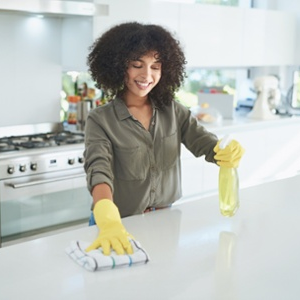4 Don’ts for Cleaning Countertops Made of Natural Stone

Regular sealing can help keep your natural stone protected and preserve its stunning appearance almost indefinitely, but you also have to do your part to keep it maintained. This not only means cleaning with care, but also being aware of the cleaning products and techniques that can actually do more harm than good when it comes to cleaning your natural stone countertops.
Fortunately, there are cleaning products designed specifically for use on natural stone surfaces. We recommend applying these products regularly with soft, lint-free cleaning rags.
What if you have stubborn stains, though? What if there’s stuck-on splatter around the stove? While these instances can certainly be challenging, turning to harsh or abrasive cleansers could exacerbate the issue. Here are just a few natural stone cleaning don’ts, and why you should steer clear.
Cleaning Don’t #1: Be Selective with Natural Cleansers
For homeowners taking an effort to reduce their carbon footprint, you may have switched to green cleaners.
While these cleaners work great on a multitude of surfaces, they’re not always appropriate for natural stone. For example, lemon and vinegar are two of the most popular additives to natural cleaning products. Which makes sense, as both feature an acidic nature that’s perfect for cutting through grease, and lemons make your house smell wonderful.
However, anything acidic is the enemy of natural stone. To a degree, a sealed stone surface will merely dull when in contact with acidic substances, but if you haven’t resealed your countertops in a while, you could end up irreparably etching or discoloring the stone.
Cleaning Don’t #2: Avoid Harsh Chemicals
There’s nothing like bleach to get even the grimiest surfaces in your home sparkling, remove surface stains, and kill off germs and bacteria. Plus, there’s something about that bleachy smell that tells you a bathroom is clean. Ammonia products are equally effective, and they don’t leave streaks on glass surfaces.
Again, however, these caustic cleaning solutions are too harsh for your natural stone countertops. Cleaning products like bleach and ammonia can not only break down sealants that otherwise protect your stone from stains and other damage, but they can then attack the stone surface itself. Harsh chemical cleaners can etch your stone, leaving permanent damage that will most likely need to be corrected by a professional.
As a side note, you should never use bleach and ammonia together. The chemical combination could create gases called chloramines that are toxic to humans, harmful to lungs, and potentially deadly when inhaled.
Cleaning Don’t #3: Never Use Abrasive Cleansers
Abrasive chemical solvents certainly work great when cleaning porcelain sinks and tubs, as well as tile and grout. However, they’re likely to do a lot more harm than good if you use them to clean your natural stone countertops. Gritty abrasives are designed to attack all kinds of stuck-on substances, from a build-up of dirt and grime, to persistent grease, to crusty pasta sauce that splattered everywhere.
That said, it’s actually damaging to natural stone. Abrasive particulates can damage your sealant and eventually reach the stone surface, where it will cause scratches and other harm. Any time you damage or stain the stone itself, you’ll have to take specific measures to address the problem, and these vary by the type of stone. Your best bet is to avoid causing damage in the first place by simply using the right cleansers to begin with.
If you’re dealing with seriously stuck-on food or other substances, you can always soak them with stone cleaner or even gentle soap (like dish soap) to loosen them up and make them easier to scrub away. Just remember to rinse thoroughly with water after (as soap can dull the finish). If all else fails, try a baking soda/water paste.
Cleaning Don’t #4: Don’t Leave Spills Sitting
Whereas pots and pans can simply soak overnight to ease the difficulty of cleaning the next day, the spills on your countertop could wreak havoc when left sitting on a natural stone surface.
This is especially true for anything acidic, such as vinegar or citrus juices, or substances known for staining, like wine. Marble is particularly prone to staining. Your best bet is to be diligent about wiping up stains immediately, before they have a chance to damage your sealant, or worse, get into the natural stone itself and cause lasting harm.
Can We Help?
We specialize in creating custom countertops in Fairfield County, CT and Westchester County, NY and would love to help you select the right surface for your home or project. Please visit us today or contact us here to learn more.



